Execution Of Three Political Prisoners In Iran Sparks Concerns
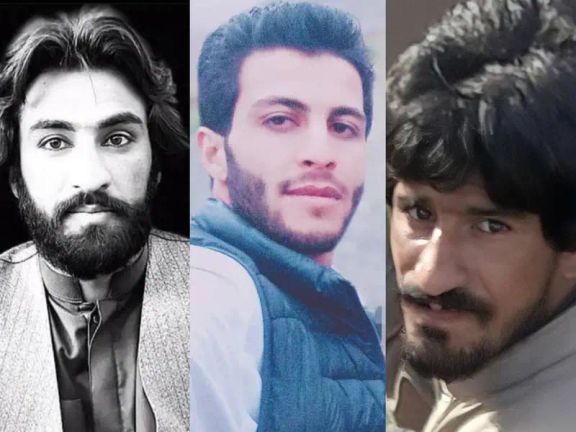
Three political prisoners were executed on Tuesday at Zahedan prison in Iran’s southeastern Sistan-Baluchistan province, which has a majority Sunni population.

Three political prisoners were executed on Tuesday at Zahedan prison in Iran’s southeastern Sistan-Baluchistan province, which has a majority Sunni population.
Mizan News Agency affiliated with Iran’s notorious Judiciary made the announcement, as it has executed more than 100 inmates in the past one month.
The condemned political prisoners were charged with alleged "membership and collaboration with Jaish ul-Adl, receiving military training, transporting and concealing bomb-making materials, as well as participating in two bombing operations in Zahedan, an unsuccessful bombing in Zabol county, and two bombing operations in Zahedan's police station."
Jaish ul-Adl, a Sunni Islamist armed group, operates predominantly in southeastern Iran, where a significant Sunni Baluchi population resides, and the border with Pakistan is porous.
The detainees, apprehended by security forces in September 2020, underwent months of interrogation before being transferred to Zahedan prison.
Last Saturday, another political prisoner was also executed after enduring 12 years of imprisonment in the same facility.
Jaish ul-Adl promptly responded to the executions, characterizing them as "a sign of the weakness and incompetence of the regime of the Supreme Leader in confronting the movement of the people of Baluchestan for the realization of their legitimate rights," as stated on its Telegram channel and website.
In a parallel development, the Oslo-based Human Rights Organization of Iran released a report on Tuesday, documenting 114 executions in the country since the commencement of the conflict in Gaza. Of these, 24 were Baluch citizens, five of whom were sentenced to death for collaborating with armed groups opposing the Islamic Republic.
The 2022 execution statistics for Iran reveal that the Sistan-Baluchestan holds the highest per capita execution rate in the country, with 39 executions per one million people.
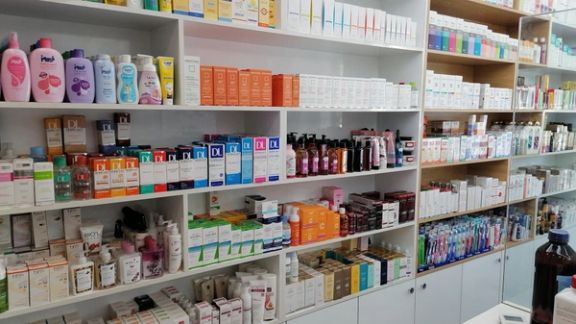
The Food and Drug Organization of Iran has reported a shortage of approximately 100 types of essential drugs within the country.
Mohammad Peikanpour, the Director-General of Drugs and Controlled Substances, highlighted the severity of the situation, noting that certain medications are in short supply due to a lack of specific currency allocations.
Peikanpour further addressed the life-threatening challenges in the availability of plasma-derived drugs, including albumin, which comes amidst already dire nursing and doctor shortages.
Mazyar Nourbakhsh, the head of the Commission for Transformation, Innovation, and Productivity at the Tehran Chamber of Commerce, shed light on the currency allocation dilemma in an interview with ILNA News Agency on Tuesday, stating, "If the delay in currency allocation and the clearance issues persist, goods will expire, leading to a loss of functionality."
The pharmaceutical industry in Iran, heavily dependent on the government for hard currency to import raw materials, is grappling with the impact of the shortages. Production of essential medicines has been disrupted, causing widespread concern among pharmaceutical companies. Local media reports indicate that various common medicines and drugs crucial for hospitals are now scarce or entirely unavailable.
The economic challenges faced by Iran, exacerbated by US oil sanctions, have strained the government's ability to allocate foreign currencies. Despite an increase in oil exports in recent months, reaching nearly six times the 2019 levels at approximately 1.5 million barrels per day, the Iranian rial is near an all-time low.
With inflation soaring above 60 percent, the country is facing a complex economic situation that is directly affecting the healthcare sector and the well-being of its citizens.
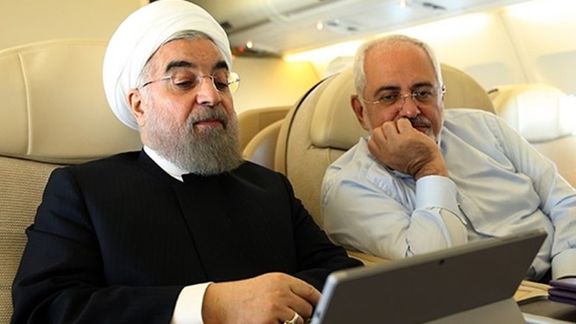
Some Iranian hardliners have been advocating for involvement in the Gaza war despite warnings from Israel, the United States and senior politicians in Tehran.
Former Foreign Minister Javad Zarif told centrist news website Entekhab that "opposition to national interests is in the nature of some of Iran's hardliners." He had disclosed earlier that hardliners sent letters to Khamenei to encourage him to intervene in the Gaza war.
Zarif said on social media that "In several interviews over the past week, I tried to explain Israel's warmongering objectives and its inhumane treatment of Palestinians over the past 70 years. Unfortunately, some of my statements were fragmented before publication and then used selectively. At times, hardliners used my statements to further their own political game."
Last week, it was reformist journalist Sara Massoumi who first reported Zarif's speech during a meeting with reformist politicians in Tehran. Massoumi quoted Zarif as having said: "If Iran is dragged into the Israel-Gaza war, nothing is going to happen to any of Iran's state officials! The bombs are going to fall on the people."
Elsewhere in the speech Zarif asked: "So far who has suffered from the sanctions? Those who make several millions of dollars, or the poor people?"
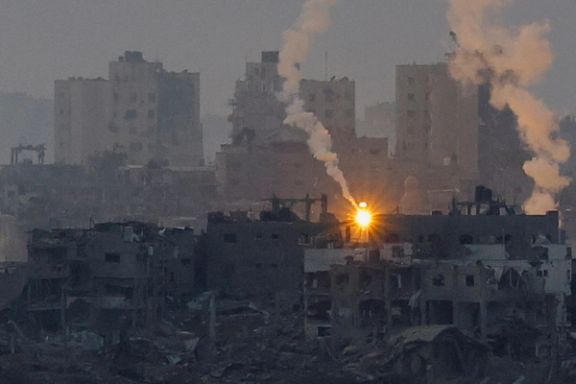
Zarif posted a video of his statement on YouTube and X, and called on viewers to see for themselves that those who accuse him of not having any concern for Palestinians were wrong or biased in their judgement. He also reiterated his call for Islamic and national solidarity in support of Palestinians.
Nonetheless, his critics continued to attack him on social media. "Congratulations Mr. Zarif! Your video clip is being used by Israeli and European channels with the caption 'Former Iranian Foreign Minister says Gaza has nothing to do with Iran.' Once again you backstabbed Iran among the Resistance groups and countries."
Zarif, in return, told Entekhab that the accusations were part of a factional polarization attempt to poison the mood in the society." Zarif had said in an earlier interview on Telegram that "Israel dreams of getting Iran and the Lebanese Hezbollah involved in the Gaza war.”
In another statement, Zarif accused Iranian hardliners of boosting Iranophobia and Islamophobia in the world with their behavior. He added that Iran has been eliminated from the international scene as many big powers do not like to engage with Tehran. He added that none of the powerful world players, particularly Russia want Iran to be able to play any part on international scene.
He further referred to the controversy about the use of Iranian drones in Russia's war against Ukraine and accused Russia of letting down Iran by getting the drones from Tehran and then disclosing Iran’s involvement in the war.
Last week, former President Hassan Rouhani had also warned against Iran becoming involved in the Israel-Hamas war in Gaza. Rouhani addressed the ongoing conflict in Gaza, warning that regime’s role in flaming the conflict was putting Iran at risk. He emphasized the potential consequences of its direct, or indirect involvement through proxies, warning that "a mistake, a wrong decision, or an imprecise action could drag the flames of war towards us."
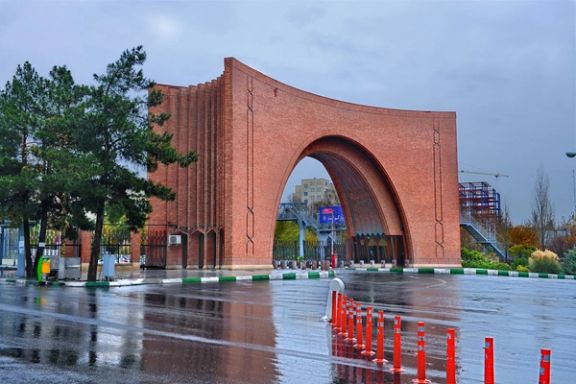
Tarbiat Modares University students in Tehran ended a two-day strike organized to protest harsh hijab enforcement and other campus restrictions by authorities.
According to the popular Telegram channel of the National Student Unions Council, Tarbiat Modares University students held their strike on Sunday and Monday under the slogan "End the Repression”.
Described as an "occupation" of the university, the document presented by the group details the oppression that the students feel as if it were a form of “martial law”. Since the suppression of protests last year, when security forces killed more than 500 civilians and arrested around 22,000 others, the authorities began cracking down on university students, who played a major role in the "Women, Life, Freedom” movement.
“Protesting and speaking out results in violence, insults, and disciplinary action," it said. "Every day we are harassed by the university security forces; insults, physical attacks, threats, and invasion of privacy are part of our daily lives."
The students believe the regime's behavior is intended to "scare, depress, and isolate” them so that their voices cannot be heard, the union claiming the regime's "goal is to silence us through force”.
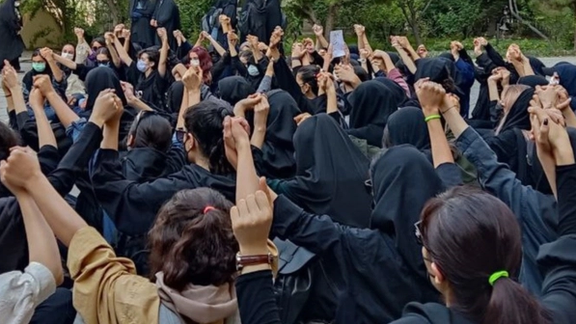
Activists say that since the beginning of the new academic year, Iran's universities have been experiencing severe security measures, which include "mass summons from intelligence and security agencies and disciplinary committees" as well as "temporary suspension" and "expulsion" orders issued to students and professors.
In their statement, the students outlined their demands. They stated that since students feel oppressed in the university environment, they propose that security forces stay away from the campus, remain at guard posts, and wear uniforms with their names on them.
Moreover, they want an end to the verbal and physical harassment of students, physical violence, phone calls, and filing of disciplinary complaints for the way students dress.
The students also demanded the overturning of new regulations governing student entry and exit from the university including gender-segregated gates.
Their statement states that the strike was the first step of an ongoing campaign and that they will continue protesting in various forms until their demands are met and university management and security make the necessary changes to make the university environment more conducive to students.
In the aftermath of last year's uprising in the wake of the death of Mahsa Amini in morality police custody, the harsh treatment of students has intensified.
A video was released on social media last week showing the head of the Faculty of Social Sciences of the University of Tehran attacking and insulting students, referring to the faculty as a "brothel" and the students as "prostitutes".
After the incident, students from another university, Tabatabai University Faculty of Social Sciences, issued a statement in support of the students who were insulted and said: "University officials have a fundamental hatred for knowledge and students."
After the backlash, Gholamreza Jamshidiha claimed that male and female students had been "kissing" and "shaking hands".
At the beginning of the current academic year, a joint statement by 12 university trade unions announced that after a year since the people's uprising, the student movement has entered a new phase of activism and resistance which will render the “government's repressive measures ineffective.”
As the new academic year approaches, "with the accumulation of experience and along the path of no return, it is time to reclaim and redefine the university as a place for building the future", it said.
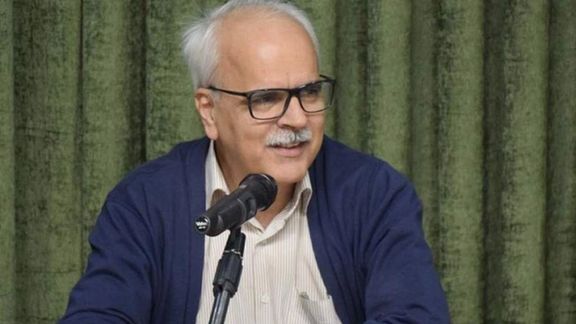
Saeed Madani, a jailed Iranian sociologist, has issued a statement from Evin Prison emphasizing the political opportunity for civil resistance in the upcoming parliamentary elections.
While the election Scheduled for March 1, Madani highlighted the chance to capitalize on the momentum of the 2022 uprising which has called for a nationwide shift away from the regime.
In February, Mousavi, from his confinement, called for the preparation of a new constitution to save Iran. Mousavi outlined the core principles of the new constitution within the framework of the Women, Life, Freedom movement.
Madani was sentenced to nine years in prison in January on charges of "forming and managing dissident groups against the system" and "propaganda against the Islamic Republic."
He called for international standards for the elections, expressing that “those advocating for change would support boycotting the elections if these standards are not met.”
Referring to the stance of Mir Hossein Mousavi, a leader of the Green Movement who opposes symbolic elections and advocates for a boycott, Madani asserted, "It is time for reformists to prioritize justice and truth."
The statement by the imprisoned researcher and national-religious political activist coincides with reports of widespread disqualifications of lawmakers critical of President Ebrahim Raisi's government. As of Sunday, approximately 40 current members of parliament and several former lawmakers or top officials were barred by the interior ministry from running in the elections.
The mass disqualifications have raised concerns among regime insiders about the potential for low voter turnout in the upcoming parliamentary elections.
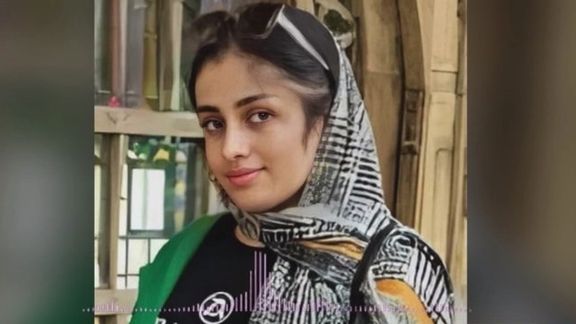
Zahra Saeedianjoo, the sister of a protester who lost his life during the Women, Life, Freedom protests in Iran, has been arrested once again.
The arrest occurred three days before the anniversary of her brother's death. Fatemeh Heydari, sister of another victim of the nationwide protests, Javad Heydari, disclosed on Monday that Saeedianjoo was detained when the Islamic Republic forces forcefully entered their residence in Izeh, located in the southern part of Iran.
The arrest comes on the heels of news in mid-October, which reported Saeedianjoo's dismissal from her job and the reception of "death threats" from unidentified motorcyclists.
There is a growing concern about the intensified pressure from security forces on the families of individuals who lost their lives during the protests. Numerous reports have surfaced in recent days detailing efforts to hinder commemoration ceremonies for those who were killed.
In a related incident, Maysam Pirfalak, the father of Kian Pirfalak, an 8-year-old boy who lost his life in Izeh last year during the protests, made an announcement on November 9. Through a video posted on his Instagram page, Pirfalak revealed that the commemoration ceremony for his son took place a week earlier beside Kian's grave in the village of Parchestan in Izeh, amid what he described as "tightened security."
Further exacerbating the situation, reports from human rights media indicate the separate detentions of Mahnaz Tarrah and Shaqayeq Moradi, by security agencies in Tehran. The Follow-up Committee of Iranian Detainees reported on Tuesday that security forces conducted a search at Moradi's residence.
Mahnaz Tarrah, with a history of past detentions and enduring judicial sentences, was released from prison in February following the “amnesty” granted to some political prisoners.
As of now, no information has been made public regarding the reasons for the recent detentions and the charges brought against the two citizens.